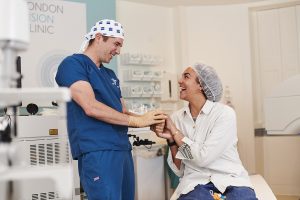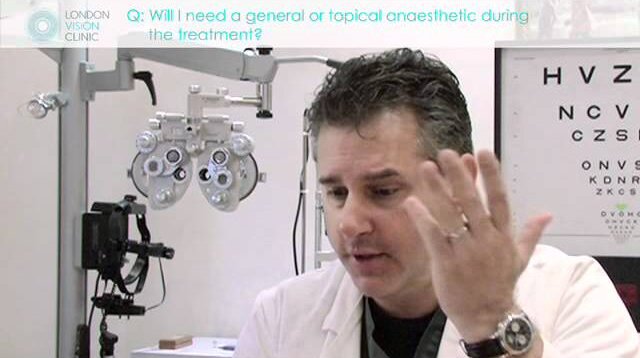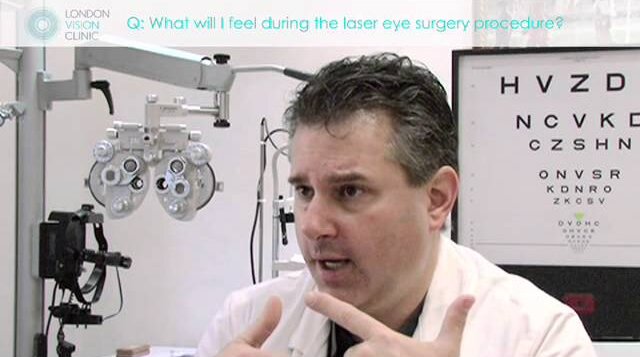Will I Receive Anaesthesia During Laser Eye Surgery Treatment?

Laser Eye Surgery has now been around for almost four decades. But despite its increasing availability and impressive advancements in this time, many people still don’t know too much about the procedure itself. This has led to persistent misinformation which, in the worst cases, may even be enough to stop prospective patients from enquiring about this life-changing treatment. So, we’re on a mission to set the record straight and make sure you’re as informed as possible throughout every step of your Laser Eye Surgery journey.
In this article, we’ll be answering the common question: Will I receive anaesthetic during Laser Eye Surgery?
Laser Eye Surgery works by changing the shape of the cornea – the part of the eye responsible for directing light towards the retina at the back of the eye. However, when refractive errors are present, the cornea is unable to focus light onto the retina effectively, leading to impaired vision.
Traditionally, refractive errors such as hyperopia (long-sightedness), myopia (short-sightedness)m astigmatism, and presbyopia (ageing eyes) have been corrected with the help of glasses or contact lenses. However, the introduction of Laser Eye Surgery in the 1980s presented another option.
Laser Eye Surgery: How Does it Work?
Modern Laser Eye Surgery builds on earlier techniques developed to change the shape of the cornea. Surgeons are able to correct the curvature of the cornea by removing a pre-determined amount of tissue from the corneal bed. This improves the refractive power of the eye allowing it to focus light more effectively on the retina.
In the old days, this was done with traditional surgical instruments, including a microkeratome (blade); however, most clinics today use high-precision lasers to remove a small section of the corneal epithelium (surface layer) or create a corneal flap as well as to remove tissue from the corneal bed. Depending on the type of treatment you receive, the epithelium is then put back in place, or a soft protective contact lens is placed over the exposed area to promote healing.
Of course, we understand that this process sounds a little uncomfortable. So, let’s get back to the question at hand: will you receive any kind of anaesthetic?
Preparing for Surgery: Topical or General Anaesthetic?
Many patients are more than a little apprehensive when they find out that they will be awake during the procedure. But alas! It’s true! Laser Eye Surgery does not require the use of general anaesthetic due to the relatively noninvasive nature of the treatment. However, all patients will be given a topical anaesthetic in the shape of eye drops.

As expert Laser Eye Surgeon, Professor Dan Reinstein, explains in the video above, these anaesthetic drops are sufficient to completely numb the cornea.
This means that, while the patient will be aware during their treatment, they should not feel any pain or serious discomfort. Furthermore, a highly-trained surgeon with access to the most up-to-date technology should be able to complete your procedure within a matter of minutes – often long before the effects of the anaesthetic wear off.
What Will I Feel?
The use of anaesthetic drops will make sure that you don’t feel any pain during your treatment. However, you will likely still experience some pressure – like a feeling of pushing and pulling on the eye. You will also see the flashing lights of the laser close to your eye which can be slightly disconcerting. But your surgeon and the clinic team will do everything we can to make sure you are as comfortable as possible throughout your treatment.

In the video above, Professor Reinstein explains how your surgeon will walk you through every step of the procedure. This makes sure you know what to expect at any given time so there are no surprises!
The bottom line is, with the use of anaesthetic drops, your treatment should be quick and painless and you will be able to start enjoying your new vision before you know it!
If you have any further questions regarding Laser Eye Surgery treatment at London Vision Clinic, don’t hesitate to get in touch with one of our friendly clinic coordinators. Alternatively, Book a Consultation today to find out if you’re suitable for treatment.


